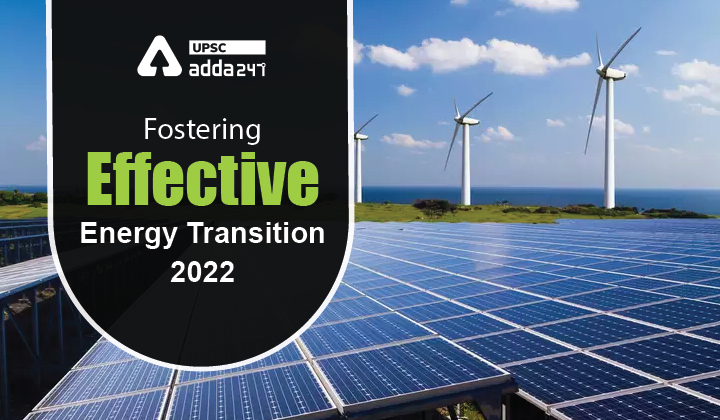Table of Contents
Fostering Effective Energy Transition: Relevance
- GS 3: Conservation, environmental pollution and degradation, environmental impact assessment.
World Economic Forum in news: Context
- Recently, World Economic Forum has released a new report titled Fostering Effective Energy Transition 2022 to provide perspective on the current challenges and recommendations on how to navigate the transition through a turbulent macroeconomic and geopolitical environment.
Fostering Effective Energy Transition: Key points
- Current energy market volatility and security constraints provide an opportunity to fasten the transition by increasing clean energy investments and transforming consumers’ energy consumption habits.
- Industrial activity generates more than 30% of anthropogenic emissions, yet many industries face considerable challenges to decarbonize.
- It is essential to make the energy transition robust as the window of opportunity to prevent the worst consequences of climate change is closing fast.
- The energy transition is not keeping pace with the growing climate urgency, and recent compounded disruptions have made the transition even more difficult.
- The lack of access to an affordable energy supply has emerged as a key threat to a just transition.
Fostering Effective Energy Transition: Key recommendations
- The diversification of the energy mix with a range of low-carbon energy sources can help strengthen energy security.
- A holistic approach is needed that delivers concurrently on the three transition imperatives – energy affordability, availability, and sustainability – at an accelerated pace.
- Actions are necessary to protect the most vulnerable through appropriate support measures, in a way that incentivizes efficient consumption.
- Moreover, behavioural interventions and fourth industrial revolution technologies can help both households and businesses.
- Diversifying the ecosystem of import partners in the short-term and diversifying the portfolio of domestic energy with low-carbon alternatives in the long-term can yield significant benefits.
- Supply-side interventions will need to be augmented with demand-side efficiencies.
Read current affairs for UPSC





 TSPSC Group 1 Question Paper 2024, Downl...
TSPSC Group 1 Question Paper 2024, Downl...
 TSPSC Group 1 Answer key 2024 Out, Downl...
TSPSC Group 1 Answer key 2024 Out, Downl...
 UPSC Prelims 2024 Question Paper, Downlo...
UPSC Prelims 2024 Question Paper, Downlo...





